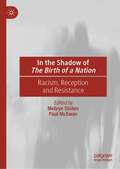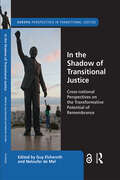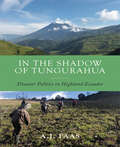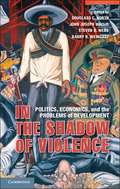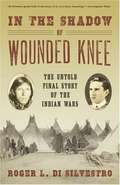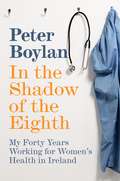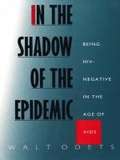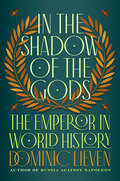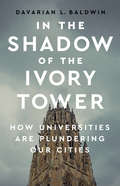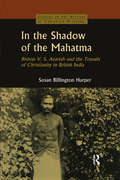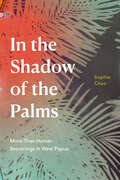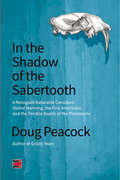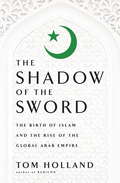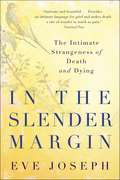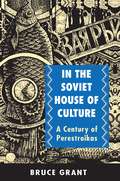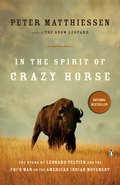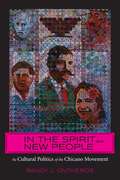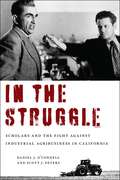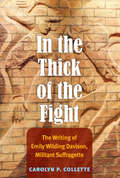- Table View
- List View
In the Shadow of The Birth of a Nation: Racism, Reception and Resistance
by Melvyn Stokes Paul McEwanThis collection brings together many of the world’s leading scholars on race and film to re-consider the legacy and impact of D.W. Griffith’s deeply racist 1915 epic The Birth of a Nation. While this film is often cited, there is a considerable dearth of substantial research on its initial impact and global reach. These essays fill important gaps in the history of the film, including essential work on its sources, international reception, and African American responses. This book is a key text in the history of the most infamous and controversial film ever made and offers crucial new insights to scholars and students working in film history, African American history and the history of race relations.
In the Shadow of Transitional Justice: Cross-national Perspectives on the Transformative Potential of Remembrance (Europa Perspectives in Transitional Justice)
by Guy ElcherothThis volume bridges two different research fields and the current debates within them. On the one hand, the transitional justice literature has been shaken by powerful calls to make the doctrine and practice of justice more transformative. On the other hand, collective memory studies now tend to look more closely at meaningful silences to make sense of what nations leave out when they remember their pasts. The book extends the scope of this heuristic approach to the different mechanisms that come under the umbrella of transitional justice, including legal prosecution, truth-seeking and reparations, alongside memorialisation. The 15 chapters included in the volume, written by expert scholars from diverse disciplinary and societal backgrounds, explore a range of practices intended to deal with the past, and how making the invisible visible again can make transitional justice - or indeed, any societal engagement with the past - more transformative. Seeking to combine contextual depth and comparative width, the book features two key case analyses - South Africa and Sri Lanka - alongside discussions of multiple cases, including such emblematic sites as Rwanda and Argentina, but also sites better known for resisting than for embracing international norms of transitional justice, such as Turkey or Côte d’Ivoire. The different contributions, grouped in themed sections, progressively explore the issues, actors and resources that are typically forgotten when societies celebrate their pasts rather than mourning their losses and, in doing so, open new possibilities to build more inclusive processes for addressing the present consequences of past injustice.
In the Shadow of Tungurahua: Disaster Politics in Highland Ecuador
by A.J. FaasIn the Shadow of Tungurahua relates the stories of the people of Penipe, Ecuador living in and between several villages around the volcano Tungurahua and two resettlement communities built for people displaced by government operations following volcanic eruptions in 1999 and 2006. The stories take shape in ways that influence prevailing ideas about how disasters are produced and reproduced, in this case by shifting assemblages of the state first formed during Spanish colonialism attempting to settle (make “legible”) and govern Indigenous and campesino populations and places. The disasters unfolding around Tungurahua at the turn of the 21st century also provide lessons in the humanitarian politics of disaster—questions of deservingness, reproducing inequality, and the reproduction of bare life. But this is also a story of how people responded to confront hardships and craft new futures, about forms of cooperation to cope with and adapt to disaster, and the potential for locally derived disaster recovery projects and politics.
In the Shadow of Violence
by Douglass C. North John Joseph Wallis Steven B. Webb Barry R. WeingastThis book applies the conceptual framework of Douglass C. North, John Joseph Wallis, and Barry R. Weingast's Violence and Social Orders (Cambridge University Press, 2009) to nine developing countries. The cases show how political control of economic privileges is used to limit violence and coordinate coalitions of powerful organizations. Rather than castigating politicians and elites as simply corrupt, the case studies illustrate why development is so difficult to achieve in societies where the role of economic organizations is manipulated to provide political balance and stability. The volume develops the idea of limited-access social order as a dynamic social system in which violence is constantly a threat, and political and economic outcomes result from the need to control violence rather than promoting economic growth or political rights.
In the Shadow of Wounded Knee: The Untold Story of the Indian Wars
by Roger L. Di SilvestroThe calamity at wounded knee, South Dakota, on December 29, 1890, is generally considered the closing salvo in America's Indian wars. But, as Roger Di Silvestro reveals in startling detail, the fight did not end at Wounded Knee. Two tragic events in early January 1891, overlooked by history, reignited passions on both sides of the conflict and forever colored its legacy.
In the Shadow of the Eighth: My Forty Years Working for Women's Health in Ireland
by Peter BoylanIn over forty years in medicine - seven of these as Master of the National Maternity Hospital - obstetrician Peter Boylan was at the births of more than 6,000 babies. He saw women and families at their most vulnerable, their most joyous, and sometimes their most heart-broken.In the Shadow of the Eighth is the story of how a young doctor without strong views on abortion became convinced that women should be trusted to make the right decisions for their lives - and how he then did everything in his power to bring about a situation where they could.More than that, it is an engaging account of working in one of medicine's most satisfying specialities, a revealing behind-the-scenes insight into what it's like trying to make change happen, and a fascinating portrait of a society in transition.Lively, gripping, sometimes enraging but always compassionate, Peter Boylan's story is vital and encouraging reading for these turbulent times.'A comprehensive, insightful and often shocking social history of the country' Irish Independent'A hero to many (including me)' @MarianKeyes'Both personal and political ... a very important history of recent events that have utterly changed Ireland's social and political landscapes' Irish Times'A fascinating story' Matt Cooper, Today FM'The book is fabulous' Pat Kenny, Newstalk
In the Shadow of the Epidemic: Being HIV-Negative in the Age of AIDS
by Walt OdetsFor gay men who are HIV-negative in a community devastated by AIDS, survival may be a matter of grief, guilt, anxiety, and isolation. In the Shadow of the Epidemic is a passionate and intimate look at the emotional and psychological impact of AIDS on the lives of the survivors of the epidemic, those who must face on a regular basis the death of friends and, in some cases, the decimation of their communities. Drawing upon his own experience as a clinical psychologist and a decade-long involvement with AIDS/HIV issues, Walt Odets explores the largely unrecognized matters of denial, depression, and identity that mark the experience of uninfected gay men.Odets calls attention to the dire need to address issues that are affecting HIV-negative individuals--from concerns about sexuality and relations with those who are HIV-positive to universal questions about the nature and meaning of survival in the midst of disease. He argues that such action, while explicitly not directing attention away from the needs of those with AIDS, is essential to the human and biological well-being of gay communities. In the immensely powerful firsthand words of gay men living in a semiprivate holocaust, the need for a broader, compassionate approach to all of the AIDS epidemic's victims becomes clear. In the Shadow of the Epidemic is a pathbreaking first step toward meeting that need.
In the Shadow of the Gods: The Emperor in World History
by Dominic LievenA dazzling account of the men (and occasional woman) who led the world&’s empires, a book that probes the essence of leadership and power through the centuries and around the world.From the rise of Sargon of Akkad, who in the third millennium BCE ruled what is now Iraq and Syria, to the collapse of the great European empires in the twentieth century, the empire has been the dominant form of power in history. Dominic Lieven&’s expansive book explores strengths and failings of the human beings who held those empires together (or let them crumble). He projects the power, terror, magnificence, and confidence of imperial monarchy, tracking what they had in common as well as what made some rise to glory and others fail spectacularly, and at what price each destiny was reached.Lieven&’s characters—Constantine, Chinggis Khan, Trajan, Suleyman, Hadrian, Louis XIV, Maria Theresa, Peter the Great, Queen Victoria, and dozens more—come alive with color, energy, and detail: their upbringings, their loves, their crucial spouses, their dreadful children. They illustrate how politics and government are a gruelling business: a ruler needed stamina, mental and physical toughness, and self-confidence. He or she needed the sound judgement of problems and people which is partly innate but also the product of education and experience. A good brain was essential for setting priorities, weighing conflicting advice, and matching ends to needs. A diplomatically astute marriage was often even more essential. Emperors (and the rare empresses) could be sacred symbols, warrior kings, political leaders, chief executive officers of the government machine, heads of a family, and impresarios directing the many elements of "soft power" essential to any regime&’s survival. What was it like to live and work in such an extraordinary role? What qualities did it take to perform this role successfully? Lieven traces the shifting balance among these elements across eras that encompass a staggering array of events from the rise of the world&’s great religions to the scientific revolution, the expansion of European empires across oceans, the great twentieth century conflicts, and the triumph of nationalism over imperialism.The rule of the emperor may be over, but Lieven shows us how we live with its poltical and cultural legacies today.
In the Shadow of the Ivory Tower: How Universities Are Plundering Our Cities
by Davarian L BaldwinAcross America, universities have become big businesses—and our cities their company towns. But there is a cost to those who live in their shadow. Urban universities play an outsized role in America&’s cities. They bring diverse ideas and people together and they generate new innovations. But they also gentrify neighborhoods and exacerbate housing inequality in an effort to enrich their campuses and attract students. They maintain private police forces that target the Black and Latinx neighborhoods nearby. They become the primary employers, dictating labor practices and suppressing wages. In the Shadow of the Ivory Tower takes readers from Hartford to Chicago and from Phoenix to Manhattan, revealing the increasingly parasitic relationship between universities and our cities. Through eye-opening conversations with city leaders, low-wage workers tending to students&’ needs, and local activists fighting encroachment, scholar Davarian L. Baldwin makes clear who benefits from unchecked university power—and who is made vulnerable. In the Shadow of the Ivory Tower is a wake-up call to the reality that higher education is no longer the ubiquitous public good it was once thought to be. But as Baldwin shows, there is an alternative vision for urban life, one that necessitates a more equitable relationship between our cities and our universities.
In the Shadow of the Mahatma: Bishop Azariah and the Travails of Christianity in British India (Studies In The History Of Christian Missions)
by Susan Billington HarperThis is a biography of Vedanayagam Samuel Azariah (1874-1945), bishop of the Anglican Church in India from 1912 until his death in 1945. His life sheds new light on the challenges and opportunities faced by religious minorities throughout the world today. As a Christian leader in a non-Christian culture, he negotiated complex cultural, social, political, and economic pressure with exceptional skill and diplomacy. As the first Indian bishop of an Anglican diocese, and as modern India's most successful leader of depressed class and non-Brahmin conversion movements to Christianity, Azariah was equally at home with the untouchables of rural India and the unreachables of the British Empire. From this platform Azariah inevitably came into contact - and, ironically, also into conflict - with the dominating presence of Mahatma Gandhi.Susan Billington Harper here reconstructs major events and issues of Azariah's public life, including a previously unstudied controversy with Gandhi over the issue of conversion and relgious freedom in the 1930s. Based on hitherto untapped primary sources, including diocesan records and vernacular oral histories expressed in both stories and songs, this fascinating volume not only provides the first critical study of Bishop Azariah's life but also offers important - at times challenging - insights for those interested in modern India and the place of Christianity within it.
In the Shadow of the Palms: More-Than-Human Becomings in West Papua
by Sophie ChaoSophie Chao examines the multispecies entanglements of oil palm plantations in West Papua, Indonesia, showing how Indigenous Marind communities understand and navigate the social, political, and environmental demands of the oil palm plant.
In the Shadow of the Sabertooth
by Doug Peacock"Doug Peacock, as ever, walks point for all of us. Not since Bill McKibben's The End of Nature has a book of such import been presented to readers. Peacock's intelligence defies measure. His is a beautiful, feral heart, always robust, relentless with its love and desire for the human race to survive, and be sculpted by the coming hard times: to learn a magnificent humility, even so late in the game. Doug Peacock's mind is a marvel-there could be no more generous act than the writing of this book. It is a crowning achievement in a long career sent in service of beauty and the dignity of life."-Rick Bass, author of Why I Came West and The Lives of RocksOur climate is changing fast. The future is uncertain, probably fiery, and likely terrifying. Yet shifting weather patterns have threatened humans before, right here in North America, when people first colonized this continent. About 15,000 years ago, the weather began to warm, melting the huge glaciers of the Late Pleistocene. In this brand new landscape, humans managed to adapt to unfamiliar habitats and dangerous creatures in the midst of a wildly fluctuating climate. What was it like to live with huge pack-hunting lions, saber-toothed cats, dire wolves, and gigantic short-faced bears, to hunt now extinct horses, camels, and mammoth? Are there lessons for modern people lingering along this ancient trail?The shifting weather patterns of today-what we call "global warming"-will far exceed anything our ancestors previously faced. Doug Peacock's latest narrative explores the full circle of climate change, from the death of the megafauna to the depletion of the ozone, in a deeply personal story that takes readers from Peacock's participation in an archeological dig for early Clovis remains in Livingston, MT, near his home, to the death of the local whitebark pine trees in the same region, as a result of changes in the migration pattern of pine beetles with the warming seasons.Writer and adventurer Doug Peacock has spent the past fifty years wandering the earth's wildest places, studying grizzly bears and advocating for the preservation of wilderness. He is the author of Grizzly Years; Baja; and Walking It Off and co-author of The Essential Grizzly. Peacock was named a 2007 Guggenheim Fellow, and a 2011 Lannan Fellow.
In the Shadow of the Sword
by Tom HollandThe acclaimed author of Rubicon and other superb works of popular history now produces a thrillingly panoramic (and incredibly timely) account of the rise of Islam. No less significant than the collapse of the Roman Republic or the Persian invasion of Greece, the evolution of the Arab empire is one of the supreme narratives of ancient history, a story dazzlingly rich in drama, character, and achievement. Just like the Romans, the Arabs came from nowhere to carve out a stupefyingly vast dominion--except that they achieved their conquests not over the course of centuries as the Romans did but in a matter of decades. Just like the Greeks during the Persian wars, they overcame seemingly insuperable odds to emerge triumphant against the greatest empire of the day--not by standing on the defensive, however, but by hurling themselves against all who lay in their path.
In the Shadow of the Sword
by Tom HollandThe acclaimed author of Rubicon and other superb works of popular history now produces a thrillingly panoramic (and incredibly timely) account of the rise of Islam. No less significant than the collapse of the Roman Republic or the Persian invasion of Greece, the evolution of the Arab empire is one of the supreme narratives of ancient history, a story dazzlingly rich in drama, character, and achievement. Just like the Romans, the Arabs came from nowhere to carve out a stupefyingly vast dominion--except that they achieved their conquests not over the course of centuries as the Romans did but in a matter of decades. Just like the Greeks during the Persian wars, they overcame seemingly insuperable odds to emerge triumphant against the greatest empire of the day--not by standing on the defensive, however, but by hurling themselves against all who lay in their path.
In the Shadows of the American Century: The Rise and Decline of US Global Power
by Alfred W. McCoyFor a decade America&’s share of the global economy has been in decline. Its diplomatic alliances are under immense strain, and any claim of moral leadership has been abandoned. America is still a colossus, possessing half the world&’s manufacturing capacity, nearly half its military forces, and a formidable system of global surveillance and covert operations. But even at its peak it may have been sowing the seeds of its own destruction. Is it realistic to rely on the global order established after World War II, or are we witnessing the changing of the guard, with China emerging as the world&’s economic and military powerhouse? America clings to its superpower status, but for how much longer?
In the Shadows of the Holocaust and Communism: Czech and Slovak Jews Since 1945
by Alena HeitlingerWhen traumatic historical events and transformations coincide with one's entry into young adulthood, the personal and historical significance of life-course transitions interact and intensify. In this volume, Alena Heitlinger examines identity formation among a generation of Czech and Slovak Jews who grew up under communism, coming of age during the de-Stalinization period of 1962-1968.Heitlinger's main focus is on the differences and similarities within and between generations, and on the changing historical and political circumstances of state socialism/communism that have shaped an individual's consciousness and identity—as a Jew, assimilated Czech, Slovak, Czechoslovak and, where relevant, as an emigre or an immigrant. The book addresses a larger set of questions about the formation of Jewish identity in the midst of political upheavals, secularization, assimilation, and modernity: Who is a Jew? How is Jewish identity defined? How does Jewish identity change based on different historical contexts? How is Jewish identity transmitted from one generation to the next? What do the Czech and Slovak cases tell us about similar experiences in other former communist countries, or in established liberal democracies?Heitlinger explores the official and unofficial transmission of Holocaust remembering (and non-remembering), the role of Jewish youth groups, attitudes toward Israel and Zionism, and the impact of the collapse of communism. This volume is rich in both statistical and archival data and in its analysis of historical, institutional, and social factors. Heitlinger's wide-ranging approach shows how history, generational, and individual biography intertwine in the formation of ethnic identity and its ambiguities.
In the Sierra Madre
by Jeff BiggersA stunning history of legendary treasure seekers and enigmatic natives in Mexico's Copper Canyon The Sierra Madre--no other mountain range in the world possesses such a ring of intrigue. In the Sierra Madre is a groundbreaking and extraordinary memoir that chronicles the astonishing history of one of the most famous, yet unknown, regions in the world. Based on his one-year sojourn among the Raramuri/Tarahumara, award-winning journalist Jeff Biggers offers a rare look into the ways of the most resilient indigenous culture in the Americas, the exploits of Mexican mountaineers, and the fascinating parade of argonauts and accidental travelers that has journeyed into the Sierra Madre over centuries. From African explorers, Bohemian friars, Confederate and Irish war deserters, French poets, Boer and Russian commandos, Apache and Mennonite communities, bewildered archaeologists, addled writers, and legendary characters including Antonin Artaud, B. Traven, Sergei Eisenstein, George Patton, Geronimo, and Pancho Villa, Biggers uncovers the remarkable treasures of the Sierra Madre.
In the Slender Margin: The Intimate Strangeness of Death and Dying
by Eve JosephLike Joan Didion's The Year of Magical Thinking, an extraordinarily moving and engaging look at loss and death. Eve Joseph is an award-winning poet who worked for twenty years as a palliative care counselor in a hospice. When she was a young girl, she lost a much older brother, and her experience as a grown woman helping others face death, dying, and grief opens the path for her to recollect and understand his loss in a way she could not as a child. In the Slender Margin is an insider's look at an experience that awaits us all, and that is at once deeply fascinating, frightening, and in modern society shunned. The book is an intimate invitation to consider death and our response to it without fear or morbidity, but rather with wonder and a curious mind. Writing with a poet's precise language and in short meditative chapters leavened with insight, warmth, and occasional humor, Joseph cites her hospice experience as well as the writings of others across generations—from the realms of mythology, psychology, science, religion, history, and literature—to illuminate the many facets of dying and death. Offering examples from cultural traditions, practices, and beliefs from around the world, her book is at once an exploration of the unknowable and a very humane journey through the land of grief.
In the Soviet House of Culture: A Century of Perestroikas
by Bruce GrantAt the outset of the twentieth century, the Nivkhi of Sakhalin Island were a small population of fishermen under Russian dominion and an Asian cultural sway. The turbulence of the decades that followed would transform them dramatically. While Russian missionaries hounded them for their pagan ways, Lenin praised them; while Stalin routed them in purges, Khrushchev gave them respite; and while Brezhnev organized complex resettlement campaigns, Gorbachev pronounced that they were free to resume a traditional life. But what is tradition after seven decades of building a Soviet world? Based on years of research in the former Soviet Union, Bruce Grant's book draws upon Nivkh interviews, newly opened archives, and rarely translated Soviet ethnographic texts to examine the effects of this remarkable state venture in the construction of identity. With a keen sensitivity, Grant explores the often paradoxical participation by Nivkhi in these shifting waves of Sovietization and poses questions about how cultural identity is constituted and reconstituted, restructured and dismantled. Part chronicle of modernization, part saga of memory and forgetting, In the Soviet House of Culture is an interpretive ethnography of one people's attempts to recapture the past as they look toward the future. This is a book that will appeal to anthropologists and historians alike, as well as to anyone who is interested in the people and politics of the former Soviet Union.
In the Sphere of The Soviets: Essays on the Cultural Legacy of the Soviet Union
by Charles MerewetherThe book distinctive is listed in points (i) it focuses on Eastern European art covering the historical avant-garde to the post-war and contemporary periods of; (ii) it looks at some key artists in the countries that have not been given so much attention within this content i.e. Georgia, Dagestan, Chechnya and Central Asia; (iii) it looks beyond Eastern Europe to the influence of Russia/Soviet Union in Asia. It explores the theoretical models developed for understanding contemporary art across Eastern Europe and focus on the new generation of Georgian artists who emerged in the immediate years before and after the country’s independence from the Soviet Union; and on to discuss the legacy and debates around monuments across Poland, Russia and Ukraine.helps in Better understanding the postwar and contemporary art in Eastern Europe.
In the Spirit of Crazy Horse
by Peter Matthiessen Martin GarbusAn "indescribably touching, extraordinarily intelligent" (Los Angeles Times Book Review) chronicle of a fatal gun-battle between FBI agents and American Indian Movement activists by renowned writer Peter Matthiessen (1927-2014), author of the National Book Award-winning The Snow Leopard and the new novel In Paradise On a hot June morning in 1975, a desperate shoot-out between FBI agents and Native Americans near Wounded Knee, South Dakota, left an Indian and two federal agents dead. Four members of the American Indian Movement were indicted on murder charges, and one, Leonard Peltier, was convicted and is now serving consecutive life sentences in a federal penitentiary. Behind this violent chain of events lie issues of great complexity and profound historical resonance, brilliantly explicated by Peter Matthiessen in this controversial book. Kept off the shelves for eight years because of one of the most protracted and bitterly fought legal cases in publishing history, In the Spirit of Crazy Horse reveals the Lakota tribe's long struggle with the U.S. government, and makes clear why the traditional Indian concept of the earth is so important at a time when increasing populations are destroying the precious resources of our world.
In the Spirit of Homebirth
by Bronwyn PreeceThe collection gives voice to those often overlooked in birthing books, including stories from indigenous families, and families from diverse socio-economic classes, religions, and urban and rural lifestyles. Also unique are the additional stories from witnesses to birth: partners describe their awe, children write sweetly of siblings' arrivals and midwives and doulas recount their experiences aiding women in their journeys. Included as landmarks amongst the stories are testaments to birth traditions such as blessingways and umbilical cord and placenta practices.From days of labor, to babies born so quickly support did not make it in time; from waterbirths at home, to transfers to the hospital; from planned pregnancies to unexpected ones; from tales of tears to tales of euphoria--the eclectic stories brought together here share one theme: they capture an intent to birth at home that comes out of a deep love for and belief in the human body and spirit. These amazing voices rise to a clarion call--women of all descents reclaiming a birthright: to give birth, and to be birthed, as they choose. It is an ancient choice made now by modern women. These stories, delightful and empowering, find the new within the old.
In the Spirit of a New People: The Cultural Politics of the Chicano Movement (American Literatures Initiative)
by Randy J OntiverosReexamining the Chicano civil rights movement of the 1960s and 1970s, In the Spirit of a New People brings to light new insights about social activism in the twentieth-century and new lessons for progressive politics in the twenty-first. Randy J. Ontiveros explores the ways in which Chicano/a artists and activists used fiction, poetry, visual arts, theater, and other expressive forms to forge a common purpose and to challenge inequality in America.Focusing on cultural politics, Ontiveros reveals neglected stories about the Chicano movement and its impact: how writers used the street press to push back against the network news; how visual artists such as Santa Barraza used painting, installations, and mixed media to challenge racism in mainstream environmentalism; how El Teatro Campesino’s innovative “actos,” or short skits,sought to embody new, more inclusive forms of citizenship; and how Sandra Cisneros and other Chicana novelists broadened the narrative of the Chicano movement. In the Spirit of a New People articulates a fresh understanding of how the Chicano movement contributed to the social and political currents of postwar America, and how the movement remains meaningful today.
In the Struggle: Scholars and the Fight against Industrial Agribusiness in California
by Daniel J. O'Connell Scott J. PetersA call to action in an ongoing battle against industrial agricultureFrom the early twentieth century and across generations to the present, In the Struggle brings together the stories of eight politically engaged scholars, documenting their opposition to industrial-scale agribusiness in California. As the narrative unfolds, their previously censored and suppressed research, together with personal accounts of intimidation and subterfuge, is introduced into the public arena for the first time. In the Struggle lays out historic, subterranean confrontations over water rights, labor organizing, and the corruption of democratic principles and public institutions. As California’s rural economy increasingly consolidates into the hands of land barons and corporations, the scholars’ work shifts from analyzing problems and formulating research methods to organizing resistance and building community power. Throughout their engagement, they face intense political blowback as powerful economic interests work to pollute and undermine scientific inquiry and the civic purposes of public universities.The findings and the pressure put upon the work of these scholars—Paul Taylor, Ernesto Galarza, and Isao Fujimoto among them—are a damning indictment of the greed and corruption that flourish under industrial-scale agriculture. After almost a century of empirical evidence and published research, a definitive finding becomes clear: land consolidation and economic monopoly are fundamentally detrimental to democracy and the well-being of rural societies.
In the Thick of the Fight: The Writing of Emily Wilding Davison, Militant Suffragette
by Carolyn P. ColletteOne of the most memorable images of the British women's suffrage movement occurred on June 4, Derby Day, 1913. As the field of horses approached a turning at Epsom, militant suffragette Emily Wilding Davison ducked out from under the railing and ran onto the track, reaching for the bridle of the King's horse, and was killed in the collision. While her death transformed her into a heroine, it all but erased her identity. To identify what impelled Davison to suffer multiple imprisonments, to experience the torture of force-feedings and the insults of hostile members of the crowds who came to hear her speak, Carolyn P. Collette explores a largely ignored source--the writing to which Davison dedicated so much time and effort during the years from 1908 to 1913. Davison's writing is an implicit apologia for why she lived the life of a militant suffragette and where she continually revisits and restates the principles that guided her: that woman suffrage was necessary to improve the lives of men, women, and children; that the freedom and justice women sought was sanctioned by God and unjustly withheld by humans whose opposition constituted a tyranny that had to be opposed; and that the evolution of human progress demanded that women become fully equal citizens of their nation in every respect-- politically, economically, and culturally. In the Thick of the Fight makes available for the first time the archive of published and unpublished writings of Emily Wilding Davison. Collette reorients both scholarly and public attention away from a single, defining event to the complexity of Davison's contributions to modern feminist discourse, giving the reader a sense of the vibrancy and diversity of Davison's suffrage writings.
